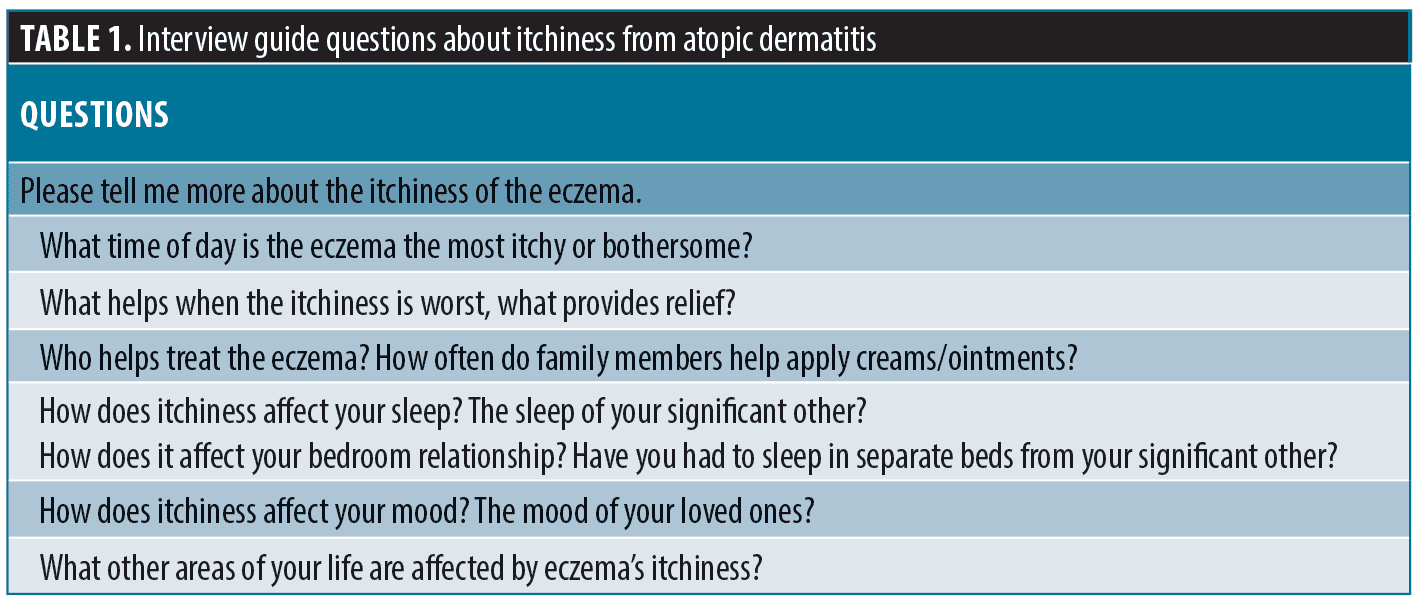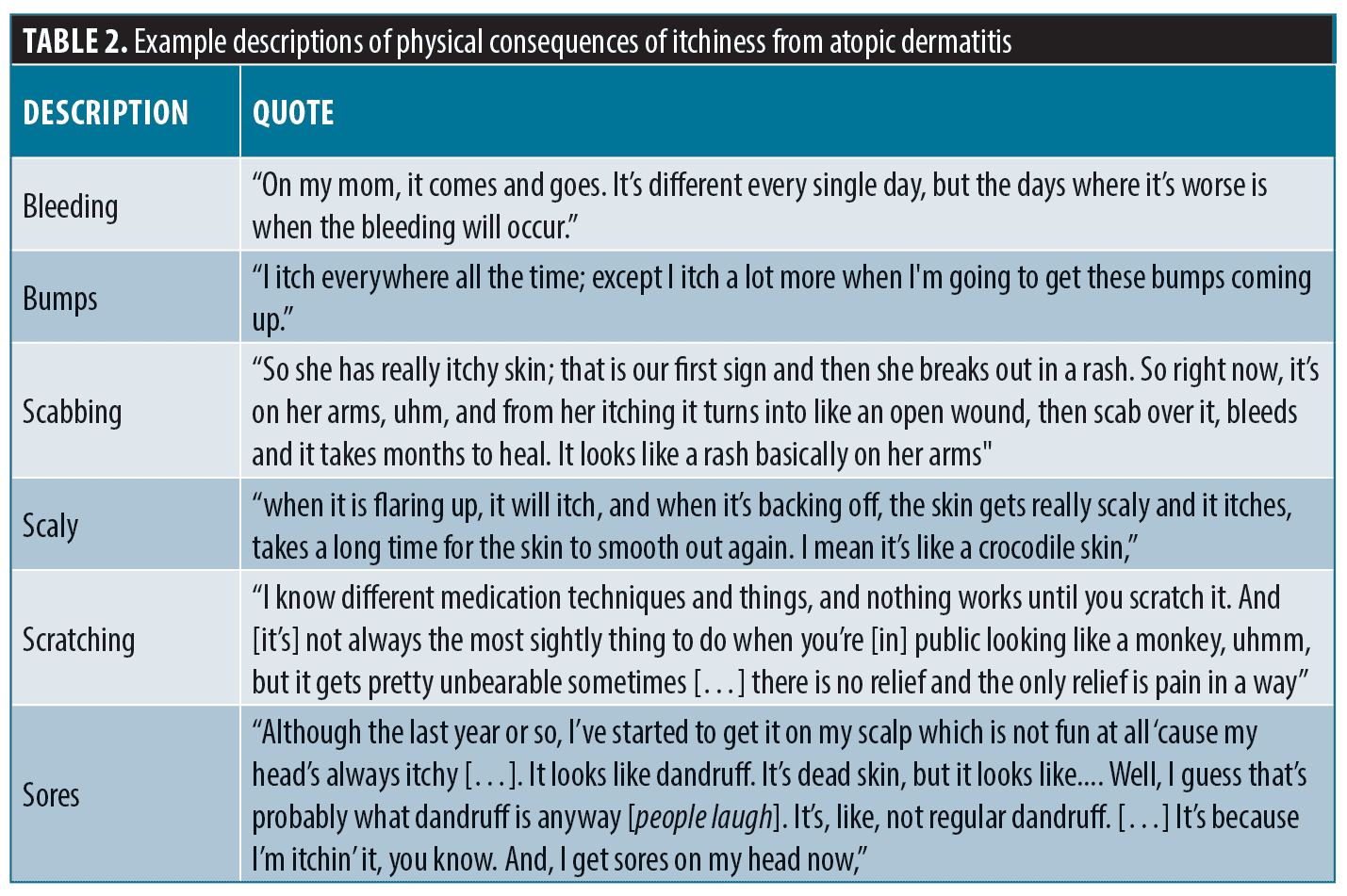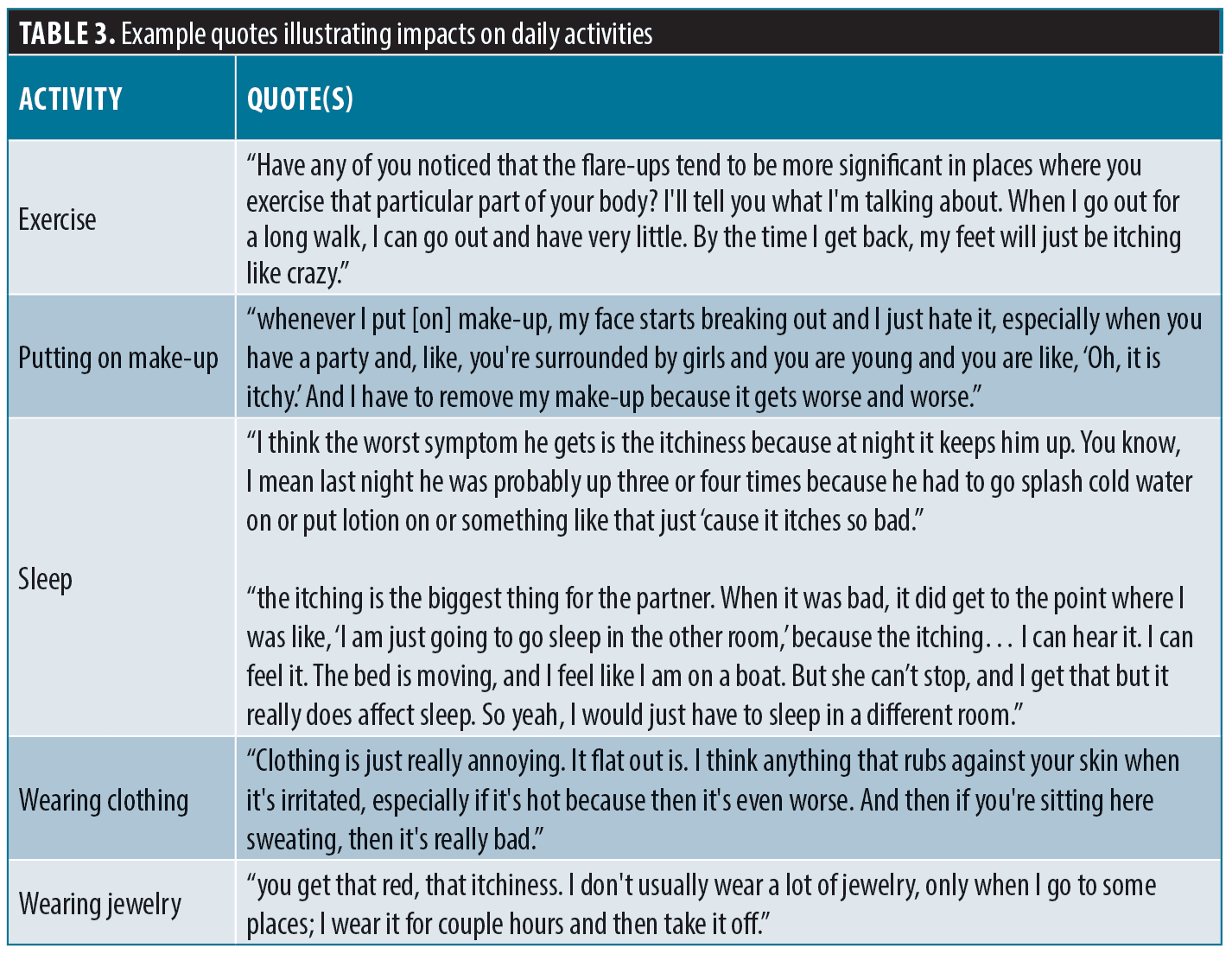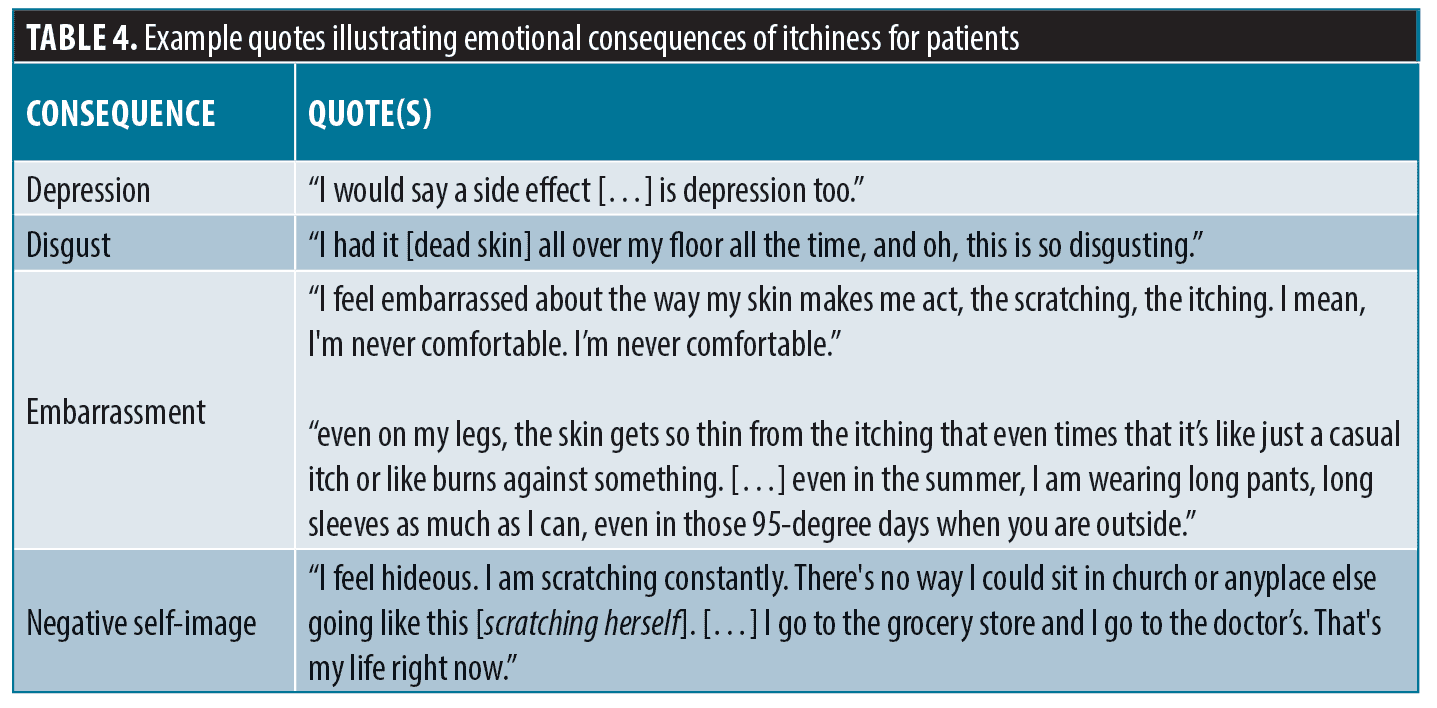 J Clin Aesthet Dermatol. 2023;16(7):22–25.
J Clin Aesthet Dermatol. 2023;16(7):22–25.
by Ashley M. Snyder, MPH, PhD; Vanina L. Taliercio, MD, MS;
Adelheid U. Brandenberger, MD; Bianca E. Rich, MD; Lisa B. Webber, BS;
Abram P. Beshay, MD; Joshua E. Biber, PhD, MBA; Rachel Hess, MD, MS;
Jamie L.W. Rhoads, MD, MS; Aaron M. Secrest, MD, PhD
Drs. Snyder, Taliercio, Webber, Beshay, Rhoads, and Secrest are with the Department of Dermatology at the University of Utah in Salt Lake City, Utah. Dr. Hess, and additionally Drs. Snyder, Biber, and Secrest are with the Department of Population Health Sciences at the University of Utah in Salt Lake City, Utah. Dr. Brandenberger is with School of Medicine the University of Utah in Salt Lake City, Utah. Dr. Rich is with the Department of Anesthesiology at the University of Utah in Salt Lake City, Utah. Additionally, Dr. Hess is with the Department of Internal Medicine at the University of Utah in Salt Lake City, Utah.
FUNDING: This research project was funded by a Discovery Grant from the National Eczema Association awarded to Dr. Secrest. Dr. Secrest was also supported by a Public Health Career Development Award from the Dermatology Foundation.
DISCLOSURES: The authors report no conflicts of interest relevant to the content of this article.
ABSTRACT: Objective. We sought to understand the consequences itchiness has on daily life that may not be immediately obvious in clinical assessments for patients with atopic dermatitis (AD).
Methods: Focus groups and interviews involving 21 patients with AD and 12 family members examined aspects of the effects of itchiness on health-related quality of life (HRQL). Investigators conducted a thematic analysis where two researchers independently coded the narratives and arrived at a consensus on major themes.
Results. Five themes emerged from our discussions. 1) Miserable experience: Itchiness was difficult to control and cease. 2) Physical damage: Damage to skin and hair occurred from scratching to alleviate the itchiness. 3) Effects on daily activities: Itchiness could affect everything participants did, including how they dressed, used make-up, and slept. 4) Effects on social activities and relationships: The discomfort and embarrassment from scratching in public and others’ reactions hindered participants’ social lives. 5) Emotional consequences: Various emotional responses to itchiness were reported, including embarrassment, depression, and irritation.
Limitations. Though qualitative research provides a level of detail not often found in quantitative analyses, this study design is limited by small sample size and generalizability.
Conclusion. Understanding these challenges can help clinicians open deeper conversations with their patients to learn more about what patients need from their dermatologic care. While itchiness from AD is well-known, this study shows that its effects on HRQL are not minimal and that patients may need further care for the consequences of this symptom.
Keywords. Atopic Dermatitis, Atopic Eczema, Pruritis, Itch, Qualitative, Quality of Life
Itchiness is a cardinal symptom of atopic dermatitis (AD) and a potentially significant stressor for patients and their family members.1 In both children and adults, moderate or severe itchiness occurs in the majority of patients.2 A US study sampled 1,278 adults and found that 7.3 percent were diagnosed with AD, which included itchy skin within the last 12 months.3 This suggests that millions of individuals suffer from itchiness associated with AD,3 with effects extending to family members as they experience challenges associated with caring for someone with AD. This is concerning because many aspects of patients’ lives can be affected, including finances, diet, and psychosocial health.4 Itching has been described as a symptom with both physical and emotional components.1 It is important that clinicians know how itchiness affects patients and their loved ones and particularly how this symptom affects health-related quality of life (HRQL).
In this qualitative study, we aimed to use interviews and focus groups to learn about the effects of itchiness from the perspectives of patients and their family members. This allowed us to obtain first-hand information on how itchiness affects HRQL. Assessing this symptom through a qualitative lens allows for a deeper understanding of the effects of itchiness than what can be achieved in quantitative research or brief conversations in clinic visits.
Methods
We conducted a qualitative study on the effects that itchiness has on patients struggling with AD and their family members. Methods for this project have been described elsewhere.5 In brief, we assessed the experiences of 21 patients and 12 family members who participated in interviews and focus groups. Patients all had atopic dermatitis diagnosed by a University of Utah Health dermatologist and provided written informed consent to participate. Family members were family of participating patients and also provided written informed consent. Semi-structured interview guides with open-ended questions were developed to explore participants’ experiences with itchiness, pain, sleep quality, and personal relationships due to AD in more depth. Questions specific to itchiness are shown in Table 1. Themes and interview questions were based on theoretical considerations, expert discussions, and an extensive literature review, in accordance with the principle of theory-driven qualitative research. Based on Carl Rogers’ person-centered approach,6 the investigators used an integrative model of patient-centeredness to develop guidelines.7 Focus groups and interviews were audio-recorded and transcribed verbatim. Using a thematic analysis approach,8,9 two investigators independently coded the transcripts and agreed on codes and major themes. Some of the final quotes included in this paper were edited to improve clarity and remove minor errors produced in the original transcripts, but no changes were made to the meaning of the quotes. NVivo 12 software (QSR International, Burlington, MA) was used to assess codes, and STATA 16 software (StataCorp, College Station, TX) was used for demographics calculations. This study was approved by the University of Utah Institutional Review Board (#98441).
Results
The median ages of patients and family members were 47 (range: 22-77) and 50 (range: 22–72) years, respectively. Most patients and family members were female (76.2% and 66.7%, respectively). Five themes emerged that highlight the far-reaching effects of itchiness on HRQL.
Theme 1. Miserable Experiences. “Itchiness is miserable,” as one patient explained. For some participants, itchiness was very hard to control and cease. The sensation of itchiness could be a persistent feeling for some: “she is constantly just scratching […] her whole body itches.” The feeling of “I can’t” came up in explanations of what it was like to control scratching. One patient explained, “I would be like, ‘Just let me get this one spot.’ It is insatiable – if people knew how good it felt, they wouldn’t tell you not to itch it.” Some patients felt that others did not understand just how bothersome the sensation of itchiness could be and how difficult it was to stop scratching: “I don’t think people that don’t have this itching can really understand that.” One patient explained that the itchiness they experienced was different from what others might understand: “It’s completely different. Now they said mine was interstitial, which means that it’s below the surface of the skin. So when you scratch, you want to dig a hole through your skin so you can get at it.”
Theme 2. Physical Damage from Itching.Some participants found that scratching could create physical damage (Table 2), but resisting was difficult because of the urge to scratch: “It’s the scratchiest syndrome. I mean, there’s no question. But if you don’t, you go crazy. So you’ve got two choices.” For some patients, scratching was essential: “My dad will always tell me, ‘Just do not itch,’ and I am like, ‘Ok, just do not breathe.” Bald spots as a result of itching were a problem for one patient: “he gets it really bad on his scalp, and so a lot of times it causes little bald spots or thinning of hair and stuff like that just because he itches it so much.” Aside from finger nails, other tools could be used for scratching, including a ring: “I […] hardly wear my wedding ring because with the itching, […] I would use it as a tool tip to scratch, yeah, so it was just better not to wear it ‘cause I could make it come off or I could also use it […] to get in deep.”
Theme 3. Daily Activities. Itchiness could also limit participants’ daily activities (Table 3). Wearing clothing and jewelry could be irritating for some patients. Certain types of clothing seemed to contribute to this: “I feel when I used really tight clothes, it really itches me, so I always used really light clothes […] so I don’t really feel something tight on my skin and I have to itch it.” Itchiness also varied by type of fiber: “if it is polyester, […] fibers that grab your skin.”
Make-up use was also affected. Some participants refused to wear make-up because of their symptoms or altered their product choices: “make-up will often trigger itchiness for me. Powder […] make-up, […] my eyes will just swell up […] I use hypoallergenic.”
Additionally, soaps could be problematic, and selecting an appropriate soap could be a difficult task. One family member explained that for their loved one, the problem was fragrance: “Well, when she comes in contact with perfumes, detergents, soaps and the smell, […] she is so sensitive; she cannot walk under the soap aisle [at] the store. She’ll break out as she goes through the aisle.” Conversely, one family member described how water, not soap, was problematic: “[she] has a water allergy, so it’s hard when she does dishes and stuff […] she has a hard time showering every single day, you know, just because of the water, itches.”
Physical activities could be affected as well. Exercise and heat were associated with itchiness: “I believe it’s sensitive to heat. Heat aggravates it if she gets overheated physically or a hot shower, has to cool off from hot showers. Physical exercise aggravates it.” Sweating was mentioned by several participants as being a trigger, and sweating might be part of why exercise could be problematic: “we watch her really close in the summer. Like, she cannot do a lot of sports because she sweats and that triggers it.” Interestingly, activity could trigger a reaction, but so could inactivity.
Itchiness disrupted sleep for some patients because they would scratch and wake up with physical damage: “my nails will be covered in blood and my sheets will be covered in blood and you wake up and you see what you did when you were sleeping, and it’s horrible.” A couple patients mentioned having to wear gloves when they sleep to minimize damage: “in the morning when I’m asleep, if I don’t leave my gloves on, I will scratch it and have blood all over my sheets.” However, gloves did not always work: “I will go to sleep with cotton gloves on and then powder-free latex gloves over it or mittens or something so I wouldn’t scratch, or I would have to put my hands under the pillow. We even wrapped tape around the top of the glove so I couldn’t take it off. And I would wake up and […] have broken through the gloves to scratch.” One patient avoided going to sleep because of itchiness: “there have been a couple nights where the poor guy is just itching to the point where he just doesn’t want to sleep, you know, so he’ll go find something else to do.” This led to consequences for his spouse: “he’ll just be itching so much that he’ll be tossing and turning that I’ll just be like, ‘I’m sleeping on the couch.’” Though family members might want to be supportive, some found it difficult to do so: “sounds so selfish but, like, it really does bother me sometimes.” However, relief from these problems is possible. Some participants found that over-the-counter antihistamines provided relief: “we give her Benadryl at night, because we’ve learned that she itches and doesn’t realize she’s itching in her sleep, so we have to drug her. I give her Benadryl so she doesn’t itch all night long, because she’ll wake up just bleeding everywhere and doesn’t remember.”
While many daily activities were limited by itchiness, sometimes being active helped decrease the sensation of itchiness: “it, like, affects her most at night because she, like, she’s not so busy in her mind so she thinks about it more. […] if she’s at work, like if she’s focused, like, in a meeting or something, she doesn’t sit there and constantly itch like she does at night.”
Theme 4. Social Activities.Other people do not always understand itchiness: “I just roll my hands and […] itch all the time, and I don’t even know I’m doing it but other people think you’re nervous because you’re just itching all the time.” Other people’s reactions were sometimes difficult for several of the patients in our study, making them self-conscious: “I don’t like to itch when I’m in public, so I just [go] to another place and itch it because you know some people will think, ‘Oh, she is dirty,’ or something or, ‘Take a shower.’” Another patient explained that itchiness affected dating: “there’s times that [I have] been, like, on dates and stuff that [I think], ‘Ok, this is itching so bad that I am going to go crazy. Ok, I am going to the bathroom’ – you know, something to go and itch in private.” However, these socially isolating experiences did not occur in all patients; some patients reported minimal interference with their social lives.
Theme 5. Emotional State. The discomfort, embarrassment, and others’ reactions from scratching in public affected the emotional state of some patients (Table 4). One patient expressed how their mood changed: “I can get pretty cranky. There are days so if I have a really bad flare-up, I am [a] lot crankier. I admit it is not fun and easy to deal with […], you know the itching.” Another patient explained they might become “irritated and kind of grumpy if [they were] not feeling good.” Patients might feel embarrassed, have a negative self-image, feel depressed, or be disgusted by the results of their itchiness. Conversely, emotional reactions might lead to itchiness. Stress and anxiety were mentioned as triggers of itchiness: “this comes from anxiety I think, on my arm, elbows.”
Emotional consequences did not just affect patients. One family member expressed the difficulty watching their loved one’s suffering: “seeing them upset over how they look or, you know, he rubs his lips raw or stuff like that and it’s just bleeding and sore. It’s hard when you care about somebody to see somebody like that.” Itchiness could affect relationships and interactions with family: “When I told her to stop scratching, she says, ‘I can’t.’ I guess her mood changes. Relationship between the two of us, it gets a little rocky because I’m bugging her to stop and she says, ‘I can’t.’”




Discussion
Itchiness in patients with AD is associated with worse HRQL.10 In this qualitative study, we gathered information on experiences directly from patients and family members affected by this symptom, and we found that itchiness could be a miserable experience for some patients. Itchiness had physical consequences on the skin as well as effects on daily activities, relationships, and self-image.
These consequences have been noted in survey research with AD patients. A study of AD in adolescents found that participants experienced effects on physical activities and sleep. Though less common, some also had problems with interpersonal relationships and going to school/holidays, similar to comments made in our study.11
Controlling itchiness is very important for improving HRQL. Caregivers might accept the use of both over-the-counter and complementary and alternative medicine treatments to control AD.12 Support groups to help address social issues may help patients cope with itchiness.13 Medication that successfully treats itchiness can improve HRQL,14 and patients with AD may see improvements in overall HRQL within a few weeks when on an effective medication.15 Some patients in our study indicated they had been able to control AD with medication, but finding effective treatments could be a challenge. Thus, some of our patients still struggled with ongoing consequences of itchiness.
The qualitative approach of this study brings a different perspective than what is achieved with questionnaires, but despite the benefits of qualitative research, this study is limited in interpretability. Thematic analysis allows insight into participants’ experiences and views, but it does not provide a quantitative assessment to determine prevalence of specific concepts. Instead, information from this study provides insight into patients’ and their family members’ experiences to stimulate future research.16 Another limitation was that all patients came from a single academic medical institution. While we attempted to recruit participants with a broad range of backgrounds, our results might not be generalizable and did not include children. Conversations may have been directed toward certain concepts because of how questions were worded, and though this limitation is inevitable, it is noteworthy because future studies can delve further into other specifics that were not thoroughly addressed here.
Conclusion
This study provides insight on the effects of itchiness from AD from the perspectives of patients and their family members. Itchiness can affect participants physically, socially, and emotionally and limit daily activities with significant consequences. We believe that understanding the effects on HRQL for patients struggling with itchiness from AD can help clinicians open up deeper conversations with their patients so they can address the most fundamental concerns patients have about coping with AD.
References
- Koblenzer CS. Itching and the atopic skin. J Allergy Clin Immunol. 1999;104(3 Suppl):S109–S13.
- Wang X, Shi XD, Li LF, et al. Prevalence and clinical features of adult atopic dermatitis in tertiary hospitals of China. Medicine (Baltimore). 2017;96(11):e6317.
- Chiesa Fuxench ZC, Block JK, Boguniewicz M, et al. Atopic dermatitis in America study: A cross-sectional study examining the prevalence and disease burden of atopic dermatitis in the US adult population. J Invest Dermatol. 2019;139(3):583–590.
- Carroll CL, Balkrishnan R, Feldman SR, et al. The burden of atopic dermatitis: Impact on the patient, family, and society. Pediatr Dermatol. 2005;22(3):192–199.
- Snyder AM, Taliercio VL, Brandenberger AU, et al. Effects of pain from atopic dermatitis: Interview and focus group study with patients and their families. JMIR Dermatol. 2021;4(2):e29826.
- Rogers CR. Client-Centered Therapy: Its Current Practice, Implications and Theory. Boston: Houghton Mifflin; 1951.
- Scholl I, Zill JM, Härter M, et al. An integrative model of patient-centeredness – a systematic review and concept analysis. PLoS One. 2014;9(9):e107828e.
- Bengtsson M. How to plan and perform a qualitative study using content analysis. NursingPlus Open. 2016;2:8–14.
- Vaismoradi M, Turunen H, Bondas T. Content analysis and thematic analysis: Implications for conducting a qualitative descriptive study. Nurs Health Sci. 2013;15(3):398–405.
- Ständer S, Yosipovitch G, Bushmakin AG, et al. Examining the association between pruritus and quality of life in patients with atopic dermatitis treated with crisaborole. J Eur Acad Dermatol Venereol. 2019;33(9):1742-1746. doi: 10.1111/jdv.15712
- Ng MS, Tan S, Chan NH, et al. Effect of atopic dermatitis on quality of life and its psychosocial impact in Asian adolescents. Australas J Dermatol. 2018;59(2):e114-e7.
- Powell K, Le Roux E, Banks J, et al. GP and parent dissonance about the assessment and treatment of childhood eczema in primary care: A qualitative study. BMJ Open. 2018;8(2).
- Blessmann Weber M, de Tarso da Luz Fontes Neto P, Prati C, et al. et al. Improvement of pruritus and quality of life of children with atopic dermatitis and their families after joining support groups. J Eur Acad Dermatol Venereol. 2008;22(8):992–997.
- Kim BS, Sun K, Papp K, et al. Effects of ruxolitinib cream on pruritus and quality of life in atopic dermatitis: Results from a phase 2, randomized, dose-ranging, vehicle- and active-controlled study. J Am Acad Dermatol. 2020;82(6):1305–1313.
- Tavecchio S, Angileri L, Pozzo Giuffrida F, et al. Efficacy of dupilumab on different phenotypes of atopic dermatitis: One-year experience of 221 patients. J Clin Med. 2020;9(9).
- Creswell JW, Creswell JD. Research Design: Qualitative, Quantitative, and Mixed Methods Approaches. 5th ed. Thousand Oaks, CA: Kindle e-Book. SAGE Publications, Inc. 2018.

